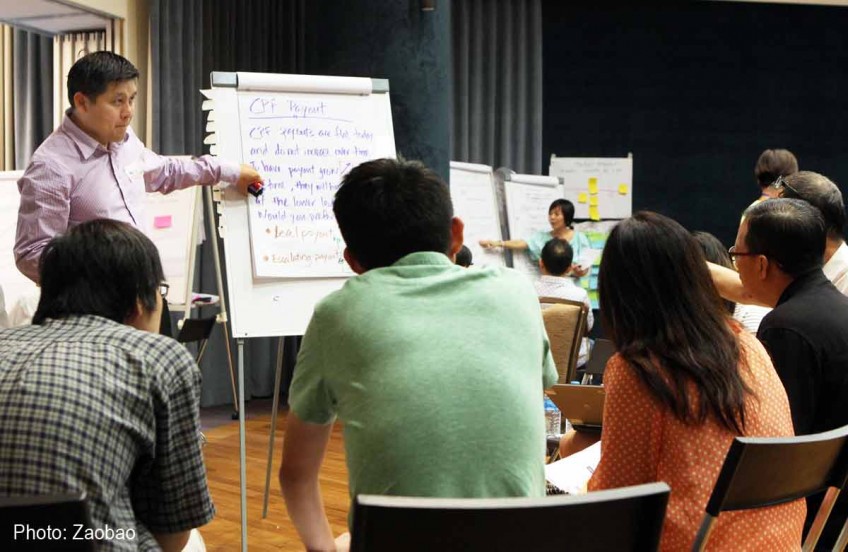More to be done to explain CPF to low-wage earners

SINGAPORE - More will be done to reach out to low-wage earners to educate them about the Central Provident Fund (CPF).
This was the assurance given by Professor Tan Chorh Chuan, chairman of the CPF Advisory Panel, yesterday after the first public focus group discussion on the CPF system.
There was a diversity of views from the 50 or so who attended the discussion at *Scape in Orchard Road - many wanted monthly payouts to increase as they got older to cope with inflation; others wanted a bigger sum earlier on.
But most agreed that the CPF system needed to be simplified so that it would be easier to understand, especially by those lower on the wage ladder.
Ms K. Thanaletchimi, a 48-year-old senior assistant manager at the National University Hospital, who represented the Healthcare Services Employees' Union at the discussion, said many of the lower-wage workers she encountered had only a vague understanding of how the CPF scheme worked.
Under the current system, CPF members who set aside a minimum sum of $155,000 at 55 years old will get a monthly payout of about $1,200 when they turn 65.
"But many don't understand how the CPF scheme works, or what the payout is about. All they know is that there are employee and employer contributions," she said. "It is important to have a scheme that everyone can understand."
Mr Daniel Yap, 35, who runs a public relations agency, shared the same view and said: "What struck me at this focus group was that people have such different ideas of what the CPF is."
He also believes more should be done to hear from the lower-wage group. "They may not have strong or robust views, but they are an important part of our society and we need to ensure they have enough for their retirement needs."
Participants, such as banker Pang Lead We, also wanted more certainty in the CPF scheme, which they said has been through many changes.
Before the roll-out of CPF Life, Mr Pang said he had transferred money from his CPF ordinary account to the special account to enjoy a higher interest rate, hoping to claim a bigger lump sum when he retired.
But when CPF Life was introduced in 2009, and made mandatory for all who would turn 55 in or after 2013, it became a system of monthly payments instead. "It is like going to the bank and signing up for a fixed deposit scheme, only to be told later that they have changed it to an annuity plan," he said. "I don't think that is very fair."
Participants were also asked whether $1,200 a month was enough, and if the payouts should remain the same each month or slowly increase as they got older. Views were split.
Some felt that $900 would be sufficient to support one's basic living expenses, while others wanted $3,000 a month as there may be people in their 60s who are still servicing mortgage loans.
Mr Yap supported the idea of receiving a smaller payout at first, with the amount rising as one ages, explaining: "It seems like the sensible thing to do, to cope with inflation." He added that medical costs will also rise with age.
But other participants preferred a bigger payout at first with the amount reducing over the years. They said they expected to be more active in their 60s, and therefore needed more money. One quipped that by the time he reached his 80s, he did not expect to still have his teeth and would "just eat porridge every day".
The 13-member CPF advisory panel, comprising academics and financial industry experts, hopes to hold 10 more focus group discussions over the next three months. The feedback will help the panel decide how to make the CPF system more flexible, an aim first announced by Prime Minister Lee Hsien Loong in his National Day Rally speech in August.
At the end of the discussion, Prof Tan, who is also president of the National University of Singapore, said: "What struck me was the diversity of views that we heard. This is quite natural, because it reflects the different circumstances, needs and perspectives of the different individuals and groups."
He agreed that more public education was needed on CPF, adding that "simple messages explaining how things work in a simple and practical way would be useful".
The next focus group is scheduled for Saturday at the same venue. Those interested to attend may sign up at www.cpfpanel.sg.
leepearl@sph.com.sg

This article was first published on Nov 16, 2014.
Get a copy of The Straits Times or go to straitstimes.com for more stories.